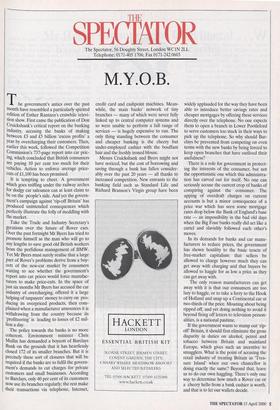SPECTAT THE OR The Spectator, 56 Doughty Street, London WC1N 2LL
Telephone: 0171-405 1706; Fax 0171-242 0603
M.Y.O.B.
he government's antics over the past month have resembled a particularly spirited edition of Esther Rantzen's erstwhile televi- sion show. First came the publication of Don Cruickshank's critical report on the banking industry, accusing the banks of making between £3 and £5 billion 'excess profits' a Year by overcharging their customers. Then, earlier this week, followed the Competition Co. mmission's 737-page report into car pric- ing, which concluded that British consumers are paying 10 per cent too much for their vehicles. Action to enforce average price- cuts of £1,100 has been promised.
It is tempting to cheer. A government Which goes sniffing under the railway arches for dodgy car salesmen can at least claim to be on the people's side. And yet the govern- ment's campaign against 'rip-off Britain' has Produced unintended consequences which perfectly illustrate the folly of meddling with the market.
Take the Trade and Industry Secretary's gyrations over the future of Rover cars. Over the past fortnight Mr Byers has tried to promote himself as the man who will go to any lengths to save good old British workers from the perfidious management of BMW. Yet Mr Byers must surely realise that a large part of Rover's problems derive from a boy- cott of the new-car market by consumers waiting to see whether the government's report into car prices would force manufac- turers to make price-cuts. In the space of just six months Mr Byers has accused the car industry of overcharging, offered it a large helping of taxpayers' money to carry on pro- ducing its overpriced products, then com- plained when a manufacturer announces it is Withdrawing from the country because its 'profiteering' is leading to losses of £2 mil- lion a day.
The policy towards the banks is no more coherent. Environment minister Chris Mullin has demanded a boycott of Barclays Bank on the grounds that it has heartlessly closed 172 of its smaller branches. But it is precisely these sort of closures that will be required if the banks are to fulfil the govern- ment's demands to cut charges for private customers and small businesses. According to Barclays, only 40 per cent of its customers now use its branches regularly; the rest make their transactions via telephone, Internet, credit card and cashpoint machines. Mean- while, the main banks' network of tiny branches — many of which were never fully linked up to central computer systems and so were unable to perform a full range of services — is hugely expensive to run. The only thing standing between the consumer and cheaper banking is the cheery but under-employed cashier with the bouffant hair and the freshly ironed blouse.
Messrs Cruickshank and Byers might not have noticed, but the cost of borrowing and saving through a bank has fallen consider- ably over the past 20 years — all thanks to increased competition. New entrants to the banking field such as Standard Life and Richard Branson's Virgin group have been widely applauded for the way they have been able to introduce better savings rates and cheaper mortgages by offering these services directly over the telephone. No one expects them to open a branch in Lower Pootleford to serve customers too stuck in their ways to pick up the telephone. So why should Bar- clays be prevented from competing on even terms with the new banks by being forced to keep open branches that have outlived their usefulness?
There is a role for government in protect- ing the interests of the consumer, but not the opportunistic one which this administra- • tion has carved out for itself. No one can seriously accuse the current crop of banks of conspiring against the consumer. The upping of overdraft charges on current accounts is but a minor consequence of a price war which has seen some mortgage rates drop below the Bank of England's base rate — an impossibility in the bad old days when the Big Four banks really did act like a cartel and slavishly followed each other's moves.
In its demands for banks and car manu- facturers to reduce prices, the government has shown hostility to the basic tenets of free-market capitalism: that sellers be allowed to charge however much they can get away with charging and that buyers be allowed to haggle for as low a price as they can get away with.
The only reason manufacturers can get away with it is that our consumers are too lazy to haggle, or to take a ferry to the Hook of Holland and snap up a Continental car at two-thirds of the price. Moaning about being ripped off, and yet doing nothing to avoid it beyond firing off letters to television person- alities, is a national pastime.
If the government wants to stamp out 'rip- off Britain, it should first eliminate the gross disparity in duties on alcohol, petrol and tobacco between Britain and mainland Europe, which gives such an incentive to smugglers. What is the point of accusing the retail industry of treating Britain as 'Trea- sure Island' when our own chancellor is doing exactly the same? Beyond that, leave us to do our own haggling. There's only one way to determine how much a Rover car or a cheery hello from a bank cashier is worth, and that is to let our wallets decide.


































































 Previous page
Previous page